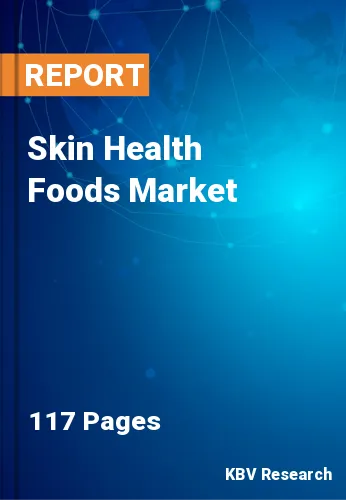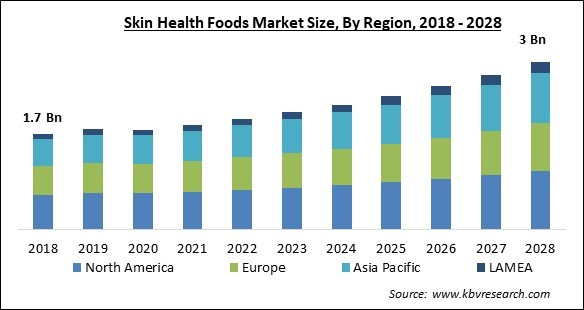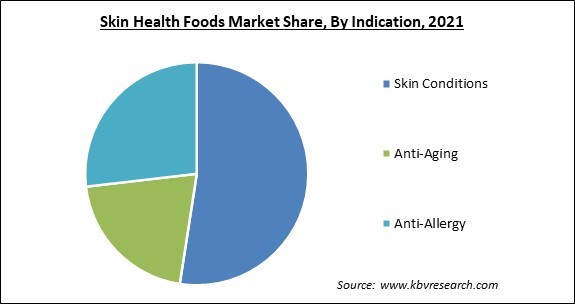
The Global Skin Health Foods Market size is expected to reach $3 billion by 2028, rising at a market growth of 7.2% CAGR during the forecast period.
Skin health foods mainly refer to food products having a sufficient amount of probiotics, omega-3, and other such things that enhance skin health. The high prevalence of allergic diseases, rising consumer health consciousness, expanding R&D and production capabilities for functional food & beverage products, and rising consumption of nutrient-rich foods to promote overall health are the main factors driving the growth of this market.

Additionally, new methods for producing high-value natural carotenoids, alternate sources for omega-3, and expansion of the retail industry in developing nations are all generating lucrative opportunities for skin health foods. The skin health foods are essentially required because despite hitting the recommended daily allowance, people simply don't get enough key skin nutrients through diets, such as vitamin A, omegas, and vitamin C, to get the ideal daily amount (which aim is to stop consumers from getting scurvy).
There are many factors that can affect how well nutrients are absorbed even when a large quantity of fish each week for omega-3s, pure liver twice a week for vitamin A, and drink freshly squeezed orange juice all day are consumed. Alcoholism, caffeine, poor gut bacteria, and smoking (or using any tobacco product) can all have an impact on how well the nutrients are absorbed by people.
Over the upcoming years, the skin health foods market is anticipated to be driven by rising physical appearance concerns among people, the growing popularity of skin health foods, and rising awareness of the health benefits associated with beauty supplements. Revenue in the skin health food market is increasing as a result of rising consumer awareness of cosmetics spending and the shift to online shopping.
Because it boosts their confidence, consumers are more self-conscious regarding their appearance nowadays. Due to this, people are choosing to invest more in skin health products in order to protect, brighten, and reduce the visibility of acne, wrinkles, and fine lines on their skin.
Due to manufacturing limitations brought on by scarcity in the first two quarters of 2020, businesses were unable to satisfy customer demand. Unexpected delivery delays of the ordered goods, which led to many consumers canceling their orders, were one of the biggest setbacks for the skin health food market. Through social media, COVID-19 united the world and significantly raised people's awareness of the importance of skincare. Well-known social media influencers started promoting skin health food products during the pandemic, which increased consumer awareness and demand for it. As a result of which, the market is expected to grow after the pandemic period.
Worldwide functional food ingredient producers are paying close attention to the rapidly expanding demand for functional food ingredients like vitamins, prebiotics, probiotics, minerals, plant extracts, phytochemicals, and omega-3 fatty acids and are investing a lot of money in the market. Nutrition bars, functional drinks, and functional confectioneries for kids like gummies and toffees are all being developed by manufacturers to appeal to consumers looking for quick nutrition as well as fitness enthusiasts.
Due to the high quality and effectiveness, natural carotenoids are in greater demand than synthetic ones, particularly in the skin health foods market. The current techniques for producing carotenoids naturally are ineffective and vulnerable to contamination. Because these processes are expensive, natural carotenoids like beta-carotene and lycopene cost almost three times as much as their synthetic counterparts. There will be a number of opportunities in the market for carotenoids as a result of the development of new methods to broaden the range of natural carotenoid production and lower the price of these products.
Skin health food ingredients are complicated, expensive, and uncertain in their development and commerce. Technological advancements, consumer demand, and governmental and regulatory frameworks all play a role in the success of product development. For a strain to be used in the research and development of new functional ingredients like probiotics, a sizable investment is needed. International food regulations are followed in the development and production of probiotic strains and products.

Based on indication, the skin health foods market is segmented into skin conditions, anti-aging, and anti-allergy. The anti-aging segment acquired a significant revenue share in the skin health foods market in 2021. Foods that contain anti-aging nutrients include fish, broccoli, salmon, green leafy vegetables, pomegranates, blueberries, guavas, dark chocolate, gooseberries, tomatoes, avocados, cucumbers, walnuts, water, cocoa, and juices.
| Report Attribute | Details |
|---|---|
| Market size value in 2021 | USD 1.8 Billion |
| Market size forecast in 2028 | USD 3 Billion |
| Base Year | 2021 |
| Historical Period | 2018 to 2020 |
| Forecast Period | 2022 to 2028 |
| Revenue Growth Rate | CAGR of 7.2% from 2022 to 2028 |
| Number of Pages | 117 |
| Number of Tables | 170 |
| Report coverage | Market Trends, Revenue Estimation and Forecast, Segmentation Analysis, Regional and Country Breakdown, Companies Strategic Developments, Company Profiling |
| Segments covered | Indication, Region |
| Country scope | US, Canada, Mexico, Germany, UK, France, Russia, Spain, Italy, China, Japan, India, South Korea, Singapore, Malaysia, Brazil, Argentina, UAE, Saudi Arabia, South Africa, Nigeria |
| Growth Drivers |
|
| Restraints |
|
Region wise, the skin health foods market is analyzed across North America, Europe, Asia Pacific and LAMEA. The North America region garnered the highest revenue share in the skin health foods market in 2021. The average amount spent on skincare food products has increased, and businesses that support health, wellness, and fitness have a larger social media presence. Furthermore, it is predicted that the rapid increase in cases of skin problems will significantly fuel market expansion in the region.
Free Valuable Insights: Global Skin Health Foods Market size to reach USD 3 Billion by 2028
The market research report covers the analysis of key stake holders of the market. Key companies profiled in the report include BASF SE, Danone S.A. (Sofina Group), DuPont de Nemours, Inc., Nestle S.A., Cargill Corporation, Arla Foods, Inc., Glanbia PLC, Herbalife nutrition Ltd., Archer Daniels Midland Company, and Koninklijke DSM N.V.
By Indication
By Geography
The global Skin Health Foods Market size is expected to reach $3 billion by 2028.
Expanding R&D As Well As Production In Food & Beverages Industry are driving the market in coming years, however, High Price Of Skin Health Food Products Would Restrict Its Demand restraints the growth of the market.
BASF SE, Danone S.A. (Sofina Group), DuPont de Nemours, Inc., Nestle S.A., Cargill Corporation, Arla Foods, Inc., Glanbia PLC, Herbalife nutrition Ltd., Archer Daniels Midland Company, and Koninklijke DSM N.V.
The expected CAGR of the Skin Health Foods Market is 7.2% from 2022 to 2028.
The Skin Conditions segment acquired maximum revenue share in the Global Skin Health Foods Market by Indication in 2021 thereby, achieving a market value of $1.5 billion by 2028.
The North America market dominated the Global Skin Health Foods Market by Region in 2021, and would continue to be a dominant market till 2028; thereby, achieving a market value of $1.0 billion by 2028.
Our team of dedicated experts can provide you with attractive expansion opportunities for your business.
